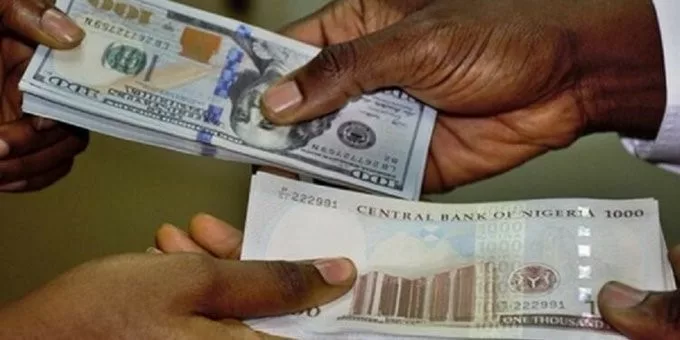Strategic monetary policies have sustained recent gains in the value of the naira, as the foreign exchange (FX) market has witnessed significant activity, recording a turnover of $17 billion, not necessarily intervention by the Central Bank of Nigeria (CBN), data reveals. Contrary to expectations, the FMDQ Securities Exchange data reveal that the CBN has only sold $581 million in the official market, representing a mere 3.2 percent of the total market turnover. This indicates that the CBN’s interventions in the FX market are not aimed at defending the naira with its foreign reserves, as previously assumed.
The CBN’s limited dollar sales contradict claims of depleting reserves to support the naira. Additionally, recent sales of approximately $60 million to Bureau De Change operators further validate that CBN interventions do not solely drive the appreciation of the naira. Despite a decline in Nigeria’s foreign reserves to $32.29 billion in April, attributed mainly to debt repayments, the CBN governor, Olayemi Cardoso, emphasises that these repayments are necessary to maintain the country’s credibility.
Financial experts attribute the recent gains in the naira to ongoing government reforms, aimed at stabilising the local currency amidst unprecedented lows in the first quarter. The CBN’s policies, including the recent sale of $10,000 to each Bureau De Change operator at a reduced rate, have bolstered liquidity and mitigated price distortions in the forex markets.
Commenting, an economist, Paul Alaje, told NATIONAL ECONOMY that recent reforms by the apex bank had put the naira slide in check. According to Alaje, the CBN is succeeding in taking out most of the actors who had no business demanding the dollar except for speculation purposes.
He said the Central Bank had decided to reorganise the forex market. Hence, for the first time the apex bank is selling the naira below what it sells on the parallel market. “The parallel market is not as profitable as it used to be. In essence, the CBN is making the official market more attractive to Nigerians in the diaspora, pushing the message, ‘don’t take your money to BDCs. So more people who have been storing the dollars are now releasing it, thus flooding the market with dollars. So, the signal to the public is that more people want the naira. As a result, the value continues to go up.
“We will get to the point where no such money will be released. I’m not sure we have gotten there. But what I know is that we will get to normalcy where we will solve some of these invisible and unrealistic demands that people who have no business with the dollars make.
“We will get to that point where we will begin to ask, what are our real needs, what are our real imports? We will come to that point in time where the Central Bank will not be able to attend to them. This comes from July to September in order to store up for the November and December market and the new year.
“I’m not saying this must necessarily happen this year; but this must happen some day because we have not solved our real challenges, which includes boosting our local exports and boosting productivity. These are two things that are really important in solving our forex challenges in the real sense of it,” he stated.
Alaje caveated that a sort of naira defense is being done by the Central Bank. He stated that if the CBN is selling at a specific rate to the BDCs in determining the value of local currency, that is defense. He said if the CBN does not sell to the BDCs, price will definitely go up. So, it is defense in a way.
He said the long-term solution to the naira crisis is on the supply side. He said, “ If we don’t have more inflow of dollars as a result of boosting our supply, including local productivity and exporting more, it will be a big challenge.
“What are the things that are inducing demand for the dollars? Can we solve them locally? We are importing tomatoes, including tin tomatoes to Nigeria; we are importing tooth picks; we are importing school uniforms; how many of these problems can we use productive efforts to solve.
“If we don’t do that, the euphoria of the rising naira value will be short-lived. Remember, this is not the first time this is happening. It happened in 2016. The difference between now and then is that then, it was the global drop in oil prices. Today, it’s supply chain crisis as a result of the wars in Ukraine and Gaza. So, how do we improve productivity, crude oil and non-oil exports? We need to increase our agro-allied production. As of now, we are still vulnerable.”
Also speaking, the chief executive of the Center for the Promotion of Private Enterprise, Dr. Muda Yusuf, noted that $17 billion is attributed to turnover of transactions from inflows, which include inflows from exporters, the oil companies, the diaspora, embassies, IMTOs, etc in three months.
He said because of the improved policy environment it is now easier for such inflows to come in. Dr Yusuf said it’s a combination of those inflows that have generated that liquidity.
“Then some of the policies of government have also helped to unlock liquidity within the country, such as the Net Open Position, the ban on dollar collateralisation for domestic loan facilities, and others have also helped to unlock liquidity.
“In addition to that, the CBN may have made some interventions. They had some loan facilities, which they got from NNPC crude oil sales. It’s the combination of those that have helped the country’s liquidity, not necessarily solely from FDIs or FPIs.”
As to whether the trend has long term sustainability, Dr. Yusuf stated that it is difficult to tell now because sustainability depends on how consistently those inflows come in and ‘how consistently we’re able to sustain the confidence in the market.’
“The capacity to sustain that kind of confidence depends first and foremost on the reserves because we need the reserves to be able to stabilise the currency if anything is going wrong or if there’s any major shortfall, especially from the portfolio flows.
“What I would suggest is that now that we have this liquidity in FX, this is the time for the CBN to use the opportunity to proceed to beef up its own buffers. They should not allow all our excess liquidity to flow into the market unhinged,” he added.





